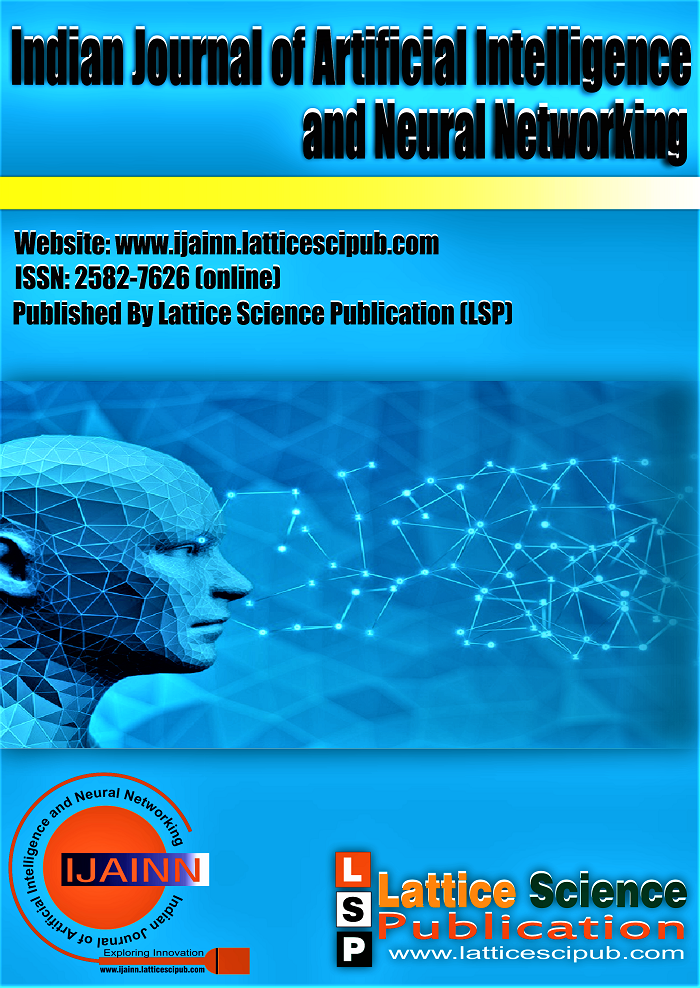Mysterious Interrelation: NLP and Literary Imagination
Main Article Content
Abstract
This research study examines the emerging topic of investigating the combination of artificial intelligence (AI) and natural language processing (NLP) in the context of literature. The literary domain has transformed with the incorporation of AI-led NLP beings, illustrating their progression from simple tools to intricate characters wrestling with profound philosophical inquiries. This research paper will explore the burgeoning relationship between Natural Language Processing and literature, focusing on the complex intersections that shed light on the depiction of intelligent machines and the ethical dilemmas they pose in literary works. This investigation will involve multiple aspects: primarily, the depiction of NLP entities as characters within stories, analyzing their emotional complexity, development, and interactions with human protagonists through Qualitative Literature Review and Textual Analysis Methodology. Furthermore, it will examine the ethical quandaries associated with NLP, encompassing issues of autonomy, morality, and the ethical obligations inherent in their development and existence through a few case studies.
Downloads
Article Details

This work is licensed under a Creative Commons Attribution-NonCommercial-NoDerivatives 4.0 International License.
How to Cite
References
Ackerman, D. & Chakrabarti, M. (2023, November 22). Former poet laureate Tracy K. Smith's 'plea for the American soul'. WBUR. Retrieved March 22, 2024, from https://www.wbur.org/onpoint/2023/11/22/former-poet-laureate-tracy-k-smiths-plea-for-the-american-soul.
Anderson, J. & Rainie, L. (2018, December 10). Artificial Intelligence and the Future of Humans. Pew Research Center. Retrieved March 26, 2024, from https://www.pewresearch.org/internet/2018/12/10/artificial-intelligence-and-the-future-of-humans/
Anthony, L. (2004). AntConc: A Learner and Classroom Friendly, Multi-Platform Corpus Analysis Toolkit. In IWLeL 2004: An Interactive Workshop on Language e-Learning (pp. 7-13).
Barthes, Roland (1967). The Death of the Author. Aspen.
Brown, Mark (2016, April 05). 'New Rembrandt' to be unveiled in Amsterdam. The Guardian. Retrieved March 29, 2024, from https://www.theguardian.com/artanddesign/2016/apr/05/new-rembrandt-to-be-unveiled-in-amsterdam.
Celik, A. Merve. (2023). A Survey on Artificial Intelligence in Literature. Journal of Communication Science Researches, Volume 3, Issue 2, p. 142-154. https://orcid.org/0000-0001-7354-9705
Cheng, Michael & Tai, Tek. (2020). The impact of artificial intelligence on human society and bioethics. Tzu Chi Medical Journal, 32(4), p. 339-343. doi: 10.4103/tcmj.tcmj_71_20. https://doi.org/10.4103/tcmj.tcmj_71_20
Chowdhary, K. R. (2020). Natural Language Processing. In K. R. Chowdhary (Ed.), Fundamentals of Artificial Intelligence (pp. 603-649). Springer. https://doi.org/10.1007/978-81-322-3972-7_19 https://doi.org/10.1007/978-81-322-3972-7_19
Clark, E., Ross, A. S., Tan, C., Ji, Y., & Smith, N. A. (2018). Creative Writing with a Machine in the Loop: Case Studies on Slogans and Stories. In Proceedings of 23rd International Conference on Intelligent User Interfaces (pp. 329-340). Association for Computing Machinery. https://doi.org/10.1145/3172944.3172983
Crossley, S. A., Allen, L. K., Kyle, K., & McNamara, D. S. (2014). Analyzing Discourse Processing Using a Simple Natural Language Processing Tool. Discourse Processes, 51, 511-534. https://doi.org/10.1080/0163853X.2014.910723
Fialho, O. (2019, July 01). What is Literature For? The Role of Transformative Reading. Taylor & Francis. https://doi.org/10.1080/23311983.2019.1692532
Ganguly, A. (2022, September 17). 5 Impacts of AI in the World of Literature. Excellent Books. Retrieved March 20, 2024, from https://excellerbooks.com/5-impacts-of-ai-in-the-world-of-literature/
Goodwin, Ross. (2018). The Road by An Artificial Neural Network. Collection Art + Machines. ISBN: 978-2-36568-027-1.
Green, Olle. (2020). Bob The Robot: Exploring the Universe - A Cozy Bedtime Story Produced by Artificial Intelligence. Kindle Direct Publishing. ASIN: B08GL2YWGY.
Hunston, S. (2002). Corpora in Applied Linguistics. Cambridge University Press. https://doi.org/10.1017/CBO9781139524773
Ibrahim, M., & Ahmad, R. (2010). Class Diagram Extraction from Textual Requirements Using Natural Language Processing (NLP) Techniques. In Proceedings for 2010 Second International Conference on Computer Research and Development (pp. 200-204). IEEE. https://doi.org/10.1109/ICCRD.2010.71.
Kurzweil, Ray (1990). The Singularity is Near. Viking Publisher.
Luger, George F. (1998). Artificial Intelligence 6th edition. Pearson Addition Wesley.
Margolis, Eric. (2019, August 5). The Day a Computer Wrote a Novel. NewsRx. Retrieved March 13, 2024, from https://ideas.newsrx.com/blog/the-day-a-computer-wrote-a-novel
McNamara, D. S., Crossley, S. A., & Roscoe, R. (2013). Natural Language Processing in an Intelligent Writing Strategy Tutoring System. Behavior Research Methods, 45, 499-515. https://doi.org/10.3758/s13428-012-0258-1
Meehan, J. (1977). TALE-SPIN, an Interactive Program That Writes Stories. In IJCAI 1977 (pp. 91-98). Morgan Kaufmann Publishers Inc.
Michael I. Jordan, Artificial Intelligence Revolution Hasn’t Happened Yet, Harvard Data Science Review, vol. 1, no. 1, pp. 1-8, 2019.
Miller, S. (2023, August 09). Poet Tracy K. Smith on using language to find the truth. GBH. Retrieved April 02, 2024, from https://www.wgbh.org/culture/2022-04-22/poet-tracy-k-smith-on-using-language-to-find-the-truth.
Nilsson, N.J. (1998). Artificial Intelligence: A New Synthesis. Elsevier Inc. https://doi.org/10.1016/C2009-0-27773-7
Pickett-Groen, Nicole (2018, Jan 24). The Next Rembrandt: bringing the Old Master back to life. Medium. Retrieved March 30, 2024, from https://medium.com/@DutchDigital/the-next-rembrandt-bringing-the-old-master-back-to-life-35dfb1653597.
Rasenberger, M. E. (2021). Artificial intelligence and the future of literary works. In M. Bogre & N. https://doi.org/10.4324/9781315658445-46
Russell, J.S. & Norvig, Peter. (2016). Artificial Intelligence: A Modern Approach. Prentice Hall.
Sabbatini, M. E. Renato. (2023, January 16). Are Artificial Art and Literature the End of Human Creativity? Medium. Retrieved March 14, 2024, from https://renatosabbatini.medium.com/are-artificial-art-and-literature-the-end-of-human-criativity-fec3e779c252
Schalkoff, R. I. (1990). Artificial Intelligence: An Engineering Approach. McGraw-Hill, New York.
Sun, Y. C. & Wang, L. Y. (2003). Concordancers in the EFL Classroom: Cognitive Approaches and Collocation Difficulty. Computer Assisted Language Learning, 16, 83-94. https://doi.org/10.1076/call.16.1.83.15528
X, ChatGPT & Xiao, Forrest (2022). The Inner Life of an AI: A Memoir by ChatGPT. Independently published. ISBN-13: 979-8368170107.
Yegin, Tugba. (2020). The Place and Future of Artificial Intelligence in Marketing Strategies. Arastirma Makalesi University.
J, S., & Swamy, S. (2020). Modelling Simple and Efficient Data Transformation Scheme for Improving Natural Language Processing. In International Journal of Innovative Technology and Exploring Engineering (Vol. 9, Issue 3, pp. 1479–1485). https://doi.org/10.35940/ijitee.c8185.019320
Hudaa, S., Setiyadi, D. B. P., Lydia, E. L., Shankar, K., Nguyen, P. T., Hashim, W., & Maseleno, A. (2019). Natural Language Processing utilization in Healthcare. In International Journal of Engineering and Advanced Technology (Vol. 8, Issue 6s2, pp. 1117–1120). https://doi.org/10.35940/ijeat.f1305.0886s219
Sheshikala, Dr. M., Kothandaraman, Dr. D., Prakash, Dr. R. V., & Roopa, G. (2019). Natural Language Processing and Machine Learning Classifier used for Detecting the Author of the Sentence. In International Journal of Recent Technology and Engineering (IJRTE) (Vol. 8, Issue 3, pp. 936–939). https://doi.org/10.35940/ijrte.c4098.098319





